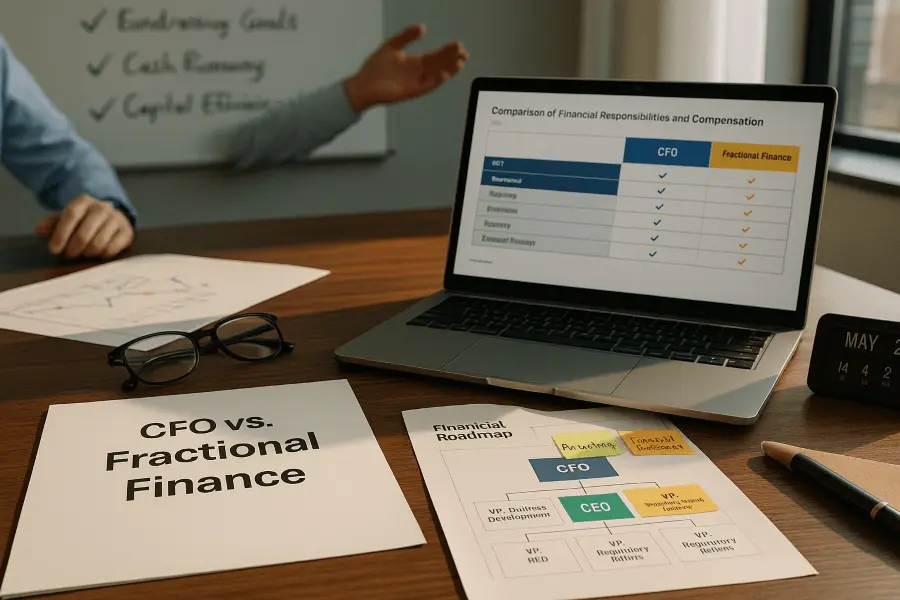The financial trajectory of biotech startups often hinges on strategic leadership decisions. One critical choice is determining the right time to hire a Chief Financial Officer (CFO) or engage a fractional finance partner. This decision can significantly impact how a company secures funding, manages investor relations, and scales operations.
For startups navigating early-stage funding, understanding broader frameworks is essential. The in-depth discussion of biotech startup fundraising strategies lays out foundational aspects of securing investments, complementing your overall understanding of funding mechanisms.
This article explores actionable insights to help biotech leaders align financial leadership with investor expectations, ensuring their company is positioned for sustainable growth.
Why Industry-Specific Financial Expertise Matters in Biotech
Biotech and healthtech companies operate in a highly regulated environment with unique financial challenges. Having a finance leader with direct industry experience is critical—not only for accurate R&D expense tracking and compliance, but also for managing the complexities of pre-revenue accounting and intangible asset recognition. A fractional CFO with biotech expertise can help set up the right systems early, ensuring your startup is prepared for audits, regulatory reviews, and investor scrutiny.
The Flexibility and Value of Fractional CFOs
Another advantage of engaging a fractional CFO is flexibility. Their involvement can ramp up during intense periods, such as fundraising or clinical trial launches, and scale back when things are quieter. This cost-effective approach allows startups to access high-level financial strategy without the commitment of a full-time hire, making it ideal for early-stage or project-based needs.
Leveraging Networks and Objective Insights
Fractional CFOs also bring valuable networks and an objective perspective. Their industry connections can open doors to new investors, partners, and service providers. As external advisors, they offer unbiased, data-driven insights—helping founders avoid common financial pitfalls and make more informed decisions.
Early-Stage Biotech: Fractional or Interim CFOs
In the early days, most biotech startups operate lean. Founders or controllers usually manage finances, focusing on bookkeeping and basic compliance. As the company approaches its first major fundraising or faces complex financial decisions, the need for experienced financial leadership grows. Many startups at this stage benefit from a fractional or interim CFO, an expert who provides strategic guidance on a part-time basis. This approach brings in high-level expertise without the full-time cost, helping with financial modeling, budgeting, and early investor communications.
Approaching Fundraising or Clinical Milestones
A full-time CFO becomes essential at least three months before a significant fundraising round, such as Series A or B. Preparing for due diligence, building robust financial projections, and answering investor questions require specialized skills.

A CFO’s experience is crucial for negotiating terms, setting valuation expectations, and ensuring all financial documentation is audit-ready. If your company is moving from preclinical to clinical development, or planning to raise institutional capital, this is the time to consider a dedicated finance leader
Growth and Complexity: The Case for a Full-Time Biotech CFO
As your biotech company grows—especially when advancing to clinical trials, managing multiple programs, or considering an IPO, the demands on financial leadership increase dramatically. A full-time CFO takes on responsibilities beyond finance, including strategic planning, investor relations, regulatory compliance, and operational analytics. The CFO becomes a key advisor to the CEO and board, ensuring the company is prepared for rapid growth, public scrutiny, and complex transactions.
Strategic Biotech CFO Services and Financing Tactics
Biotech startups often face unique financial hurdles, including high research and development costs and extended timelines to bring products to market. These challenges demand specialized financial leadership, making the role of a biotech CFO pivotal in steering companies toward sustainable growth.
Fractional CFO Services: A Cost-Effective Solution
For early-stage biotech ventures, fractional CFO services provide a scalable and budget-friendly alternative to hiring full-time executives. These professionals align funding strategies with investor expectations, ensuring that capital is secured efficiently without compromising operational goals. With 43% of biotech CEOs indicating an urgent need for funding, fractional CFOs can help mitigate delays and optimize fundraising efforts.
Additionally, the median interval between funding rounds has increased by 84%, highlighting the importance of strategic planning to maintain momentum. Fractional CFOs excel in bridging these gaps, offering expertise tailored to the biotech sector’s complexities.
Real-World Success Stories
The biotech industry has seen tangible benefits from early engagement with fractional CFOs. For instance, Kintara Therapeutics successfully streamlined its fundraising strategy by accelerating CFO hiring timelines. This proactive approach contributed to the sector raising $5.9 billion in Q1 2024, showcasing the impact of strategic financial leadership.
To explore deeper strategies for expanding biotech ventures with growth capital, a review of scaling biotech startup funding offers valuable insights into aligning growth stages with available resources.
Future Outlook
With the biotech sector projected to reach $546 billion by 2025, the demand for strategic financial expertise will only grow. Fractional CFO services are poised to play an increasingly critical role in helping startups navigate the complexities of fundraising and scaling operations effectively.
Action Points for Founders
- Engage a fractional CFO when approaching your first institutional fundraising or facing complex financial decisions.
- Plan to hire a full-time CFO at least three months before major fundraising, clinical milestones, or public company ambitions.
- Prioritize candidates with biotech experience, strong investor networks, and a track record in capital raising and compliance.
- Involve your board and senior team in the hiring process to ensure alignment and trust
Conclusion
The biotech sector is poised for remarkable growth, with funding projected to reach $546 billion by 2025. This trajectory underscores the importance of strategic financial leadership, especially during critical fundraising intervals. With $5.9 billion raised in Q1 2024 and a 43% urgency in funding timelines, aligning your CFO or fractional finance partner with these milestones can be transformative.
Scaling challenges demand expertise, and timing your financial hires to match your venture’s growth phase ensures smoother transitions and optimized capital strategies. Whether you're addressing operational complexities or preparing for your next funding round, expert guidance can make all the difference.
If you're ready to elevate your biotech venture, we invite you to explore our Fundraising Assistance service. At Qubit Capital, we specialize in securing the capital you need to innovate and thrive. Let’s take your vision to the next level.
Key Takeaways
- Engaging a CFO early aligns financial strategy with biotech growth and fundraising needs.
- Fractional CFOs offer flexible, cost-effective leadership for startups.
- Strategic CFO hiring can mitigate funding delays and improve investor relations.
- Real-world case studies underscore the benefits of timely CFO engagement.
- Adaptable financing tactics are essential for navigating extended funding cycles.
Frequently asked Questions
What is the best time for biotech companies to raise funds?
Biotech companies often find the most success in fundraising when they have reached significant R&D milestones. Investor interest typically peaks during transitions to clinical or commercial phases, as these stages demonstrate tangible progress and potential for returns. Timing funding rounds strategically can maximize valuation and attract more robust investor interest.






